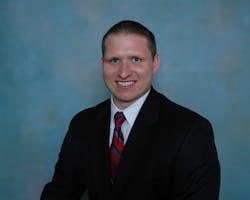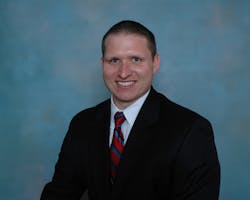From the operatory and beyond: An interview with one of dentistry’s top salespeople
I recently have received an inquiry from a fellow clinician, who explained that her dentist is retiring soon, and though she has a passion for dentistry, she’s not sure that she’s ready for the transition to a new dentist. She explained that her present dentist is so wonderful that she couldn’t possibly work for anyone else, and she wanted to know what options are available beyond the operatory.
While visiting with dear friend and successful clinical assistant/sales manager colleague Brian Thacker (district sales manager for KOMET USA), I asked him this question, as he has a personal success story to share on this same topic. He consented to an interview, and here is what he shared.
Tina: Brian, please tell us about your dental background. How did you start out in dentistry?
Brian: In the military, clinical assistants are known as dental techs, and I received my training in clinical assisting through the Coast Guard in 1995. During our dental training, we rotated through oral surgery, endodontics, general dentistry, and lab duties every six months for an overall clinical experience. I had the opportunity to be stationed in Hawaii, and I received my bachelor’s degree in business management. I had the desire to attend dental school, and I thought having a degree would help to manage a dental office. Once I was out of the military, my family moved to Georgia, where I worked in an orthodontics office as a clinical assistant/office manager. This is certainly where I gained an appreciation for the work of dental auxiliaries, especially those with dual titles, as it’s not easy to serve two positions at once, but as everyone knows in dentistry, you make it work to the best of your ability. There is nothing like a challenge to sharpen one’s skill set.
Tina: I agree Brian, there is always a way to sharpen your skills no matter what your title. One of the best gifts life has given to several of my colleagues is a mentor. Did you have one to help direct your path in dentistry, and how did your experience in dentistry help with your transition from a clinical assistant/office manager to a sales manager?
Brian: I did not have a mentor at that time. I had to find the drive of success within myself. I realized that I had reached the pinnacle of my personal achievements in the operatory and office management, I was ready to grow beyond what I knew, and wanted to know how I could apply it to other avenues in dentistry. It so happened that one of my local representatives saw my potential and knew that I was thinking of going to dental school. He told me there was an opening with the dental supplier he was with, and suggested that I apply. After applying and working with the supply company for a while, I had to think seriously about what I wanted and where I needed to be, not just in my career but for my family as well. It wasn’t long before an opportunity with a rotary instrument company came along, and I could not refuse. So I figured if I could sell optimal care and educate my patients to a healthier smile and lifestyle with sincerity as a clinical assistant, then I could provide the same level of service as a district sales manager with KOMET USA.
Tina: I have been told that you are the leading sales person with KOMET USA five years in a row. Will you please share with us the key principles in sales that you apply to reach this goal, and can these principles be applied in the operatory?
Brian: Ha! Who let the secret out of the bag?
Tina: Your team assistant Candy McClean. She is very proud of you.
Brian: Wow, Candy is an exceptional teammate, she always looks out for me. To answer your question, yes, I have achieved my goal of leading salesperson five years in a row. Key principles that come to mind are 1) self discipline and planning the workday, 2) networking with local offices, study groups, dental labs, and vendors, 3) ongoing growth in knowledge of products, procedures, and new technologies, 4) self confidence and integrity — Are you confident with your work and what you offer within the dental practice? Are you honest with your team and patients? and 5) ask open-ended questions for a quality sale.
Tina: Wow, Brian, those are five true principles that everyone could put to good use, which brings us to our next question, what drives you to be this successful?
Brian: Well, my family likes to eat and they mean the world to me, so the determination comes in providing for them, and a desire to want to be successful. In order to attain success for myself, my family, and the company, I write out my goals daily, weekly, and yearly. The question I ask myself is, “where do I want to be at the end of every day, every month, and every year?”
ABOUT TINA CALLOWAY:KOMET Korner Q&A with Tina M. Calloway, CDA
Tina: What advice would you give dental assistants and office managers to maximize the limited time they have with their local representative/district manager?
Brian: I would advise the dental auxiliary to know what the practice needs are, and where the practice interests lie. Do you truly have an understanding of what your budget is and what you’re really spending per year? By not meeting with your representative, you’re losing out on valuable information to help the practice get organized and cut overhead. As a district manager/representative, I strive to be a fellow team member to my clients, I am not “selling,” I am building relationships.
Tina: What is the best way to build a relationship with a district manager/representative?
Brian: Schedule a lunch ‘n’ learn, or set aside five to 10 minutes to see what the rep has to say. In my experience, I have found that most dental auxiliaries feel that we are only out to make money, when in reality we would like to help dental teams and dentists add efficiency to their workday with what we have to offer and what fits the needs of the practice.
Tina: As clinical assistants we can identify the need for efficiency in the opreatory, and with purchasing and inventory control. I know you’ve demonstrated this with our team by sharing with us the best tools and burs to use during a procedure. What three essentials would you share when it comes to ordering while saving money without losing quality?
Brian: Three key essentials would be ordering in bulk to increase your purchasing power. If you order directly from a manufacturer, they normally can provide a better net price on a product when a bulk order is placed. A good example would be as if you were shopping at your local Costco or Sam’s Warehouse. Think of the savings you receive when you purchase a product from a place like this in bulk compared to a single item you would purchase weekly or biweekly. Secondly, know what your budget is on a monthly basis. And finally, the best way to monitor your purchasing is to create a catalog that shows the breakdown of money spent in each category.
Tina: Thank you, Brian, for sharing your knowledge and expertise with the dental community. We truly appreciate the exceptional service and professionalism you bring as a behind-the-scenes team member to our practice.
Ms. Calloway is a Texas native who served in the U.S. Navy in 1992 and received her dental assisting training in Marietta, Ga. Now living in North Carolina, she has worked in dentistry for 17 years as a full-time dental assistant, is the past president of the Piedmont Dental Assistant Society, and is currently a clinical assisting consultant. Ms. Calloway is a member of the North Carolina Dental Assistants Association and the American Dental Assistants Association (ADAA).

